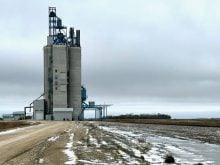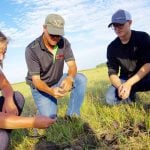The manufacturer of the controversial canola-seed treatment chemical lindane believes the federal government will reverse its 1999 decision to take the product off the market.
Last week, a review board created by the Pest Management Regulatory Agency held hearings in Ottawa to listen to arguments from Connecticut-based Crompton Corp. about why its insecticide should be reregistered as a legal product for use on Canadian canola.
The three-member PMRA review panel, chaired by University of Guelph environmental biology professor Len Ritter and including two American specialists, will make a recommendation to health minister Ujjal Dosanjh.
Read Also

Farmland ownership fires up Saskatchewan politicians
Saskatchewan politicians debate the enforcement of farmland ownership laws in the province.
In August 2004, company lawyers sent a memo to the U.S. Environmental Protection Agency predicting victory in Canada. They used the prediction to argue that the EPA also should allow lindane-treated products into the United States.
“Crompton believes that an impartial review of PMRA’s occupational risk assessment of lindane will expose numerous and substantial flaws in PMRA’s rationale for barring lindane,” lawyers Charles O’Connor and Michael Boucher wrote in an Aug. 3 e-mail. “This review also should result in a reinstatement of lindane registration in Canada.”
The chemical was withdrawn in late 1999, effective July 2001, at the request of the canola industry. The industry was concerned markets would be lost in the U.S. because the EPA had ruled that canola treated with the chemical could not cross the border since it is not registered for use on American canola.
The lindane review gives the company a chance to argue its case that the insecticide is safe.
The Sierra Club of Canada angrily withdrew as an intervener in the process last week after much of the evidence it wanted to present about the environmental damage lindane causes was rejected by the panel as beyond the scope of its review into the ramifications of occupational exposure.
Angela Rickman of the Sierra Club told a Parliament Hill news conference that the panel appeared biased in favour of the company. She released a copy of the company e-mail.
She called the panel process “fundamentally flawed.”
At the Canola Council of Canada in Winnipeg, Joanne Buth said the council did not ask for intervenor status but will be watching carefully when the recommendation is made to the minister.
“At this time, we do not want to see it reregistered,” she said.
“For us, it was never based on safety. It is a trade issue. If there isn’t an approved tolerance in the U.S., it is a potential trade irritant for us and we don’t need that.”
Ritter, the panel chair, has been executive director of the Canadian Network of Toxicology Centres.
He was involved in the 1990s debate over whether to approve Monsanto’s dairy growth hormone bovine somatotropin, or BST. Ritter testified at Parliament Hill hearings that the hormone product was safe.
When it became known that some of his research benefitted from Monsanto funding, opponents of BST accused him of conflict of interest. Ritter reacted bitterly and at first refused to appear before a Senate committee studying the issue. He appeared after being threatened with a subpoena.
The committee recommended BST not be approved and Health Canada eventually agreed.














